Crizocent (Crizotinib) 250 mg
£0.00
Crizotinib is an inhibitor of receptor tyrosine kinases including ALK, Hepatocyte Growth Factor Receptor (HGFR, c-Met), ROS1 (c-ros), and Recepteur d’Origine Nantais (RON). Translocations can affect the ALK gene resulting in the expression of oncogenic fusion proteins. The formation of ALK fusion proteins results in activation and dysregulation of the gene’s expression and signaling which can contribute to increased cell proliferation and survival in tumors expressing these proteins. Crizotinib demonstrated concentration-dependent inhibition of ALK, ROS1, and c-Met phosphorylation in cell-based assays using tumor cell lines and demonstrated antitumor activity in mice bearing tumor xenografts that expressed echinoderm microtubule-associated protein-like 4 (EML4)- or nucleophosmin (NPM)-ALK fusion proteins or c-Met.
Indications
Crizotinib is a kinase inhibitor indicated for the treatment of patients with-
• Metastatic non-small cell lung cancer (NSCLC) whose tumors are anaplastic lymphoma kinase (ALK)-positive
• Metastatic NSCLC whose tumors are ROS1-positive
Dosage & Administration
Recommended Dose: 250 mg orally, twice daily
• Renal Impairment: 250 mg orally, once daily in patients with severe renal impairment (creatinine clearance <30 mL/min) not requiring dialysis.
Geriatric Use
No differences in safety or efficacy were observed between older and younger patients. Clinical studies of Crizotinib in patients with ROS1-positive metastatic NSCLC did not include sufficient numbers of patients age 65 years and older to determine whether they respond differently from younger patients
Hepatic Impairment
Caution should be used in patients with hepatic impairment
Renal Impairment
No starting dose adjustment is needed for patients with mild (CLcr 60-89 mL/min) or moderate (CLcr 30-59 mL/min) renal impairment based on a population pharmacokinetic analysis.
Increased exposure to crizotinib occurred in patients with severe renal impairment (CLcr <30 mL/min) not requiring dialysis. Crizotinib should be administered at a dose of 250 mg taken orally once daily in patients with severe renal impairment not requiring dialysis.
Pediatric Dose
The safety and effectiveness of Crizotinib in pediatric patients have not been established.
Side Effects
The most common adverse reactions (≥25%) are vision disorders, nausea, diarrhea, vomiting, edema, constipation, elevated transaminases, fatigue, decreased appetite, upper respiratory infection, dizziness, and neuropathy.
Precautions
Hepatotoxicity: Patients should undergo periodic liver testing. Crizotinib should be temporarily suspended, dose reduced or permanently suspended
• Interstitial lung disease (ILD)/ Pneumonitis: Drug should be permanently discontinued in patients with ILD/ Pneumonitis
• QT interval prolongation: Electrocardiograms and electrolytes in patients who have a history of or predisposition for QTc prolongation, or who are taking medications that prolong QT should be monitored. Crizotinib should be temporarily suspended, dose reduced or permanently suspended
• Bradycardia: Crizotinib can cause bradycardia. Heart rate and blood pressure should be regularly monitored. Crizotinib should be temporarily suspended, dose reduced or permanently suspended
• Severe visual loss: Ophthalmological evaluation should be performed. Crizotinib should be discontinued in severe visual loss
• Embryo-fetal toxicity: Crizotinib can cause fetal harm. Females of reproductive potential should be advised of the potential risk to a fetus and use of effective contraception
Use in Pregnancy & Lactation
Based on its mechanism of action, Crizotinib can cause fetal harm when administered to a pregnant woman. There are no available data on the use of Crizotinib during pregnancy. Females of reproductive potential should be advised of the potential risk to a fetus and use of effective contraception.
There is no information regarding the presence of Crizotinib in human milk, the effects on the breastfed infant, or the effects on milk production. Because of the potential for adverse reactions in breastfed infants patients should not breastfeed during treatment with Crizotinib and for 45 days after the final dose.
Geriatric Use
No differences in safety or efficacy were observed between older and younger patients. Clinical studies of Crizotinib in patients with ROS1-positive metastatic NSCLC did not include sufficient numbers of patients age 65 years and older to determine whether they respond differently from younger patients
Hepatic Impairment
Caution should be used in patients with hepatic impairment
Renal Impairment
No starting dose adjustment is needed for patients with mild (CLcr 60-89 mL/min) or moderate (CLcr 30-59 mL/min) renal impairment based on a population pharmacokinetic analysis.
Increased exposure to crizotinib occurred in patients with severe renal impairment (CLcr <30 mL/min) not requiring dialysis. Crizotinib should be administered at a dose of 250 mg taken orally once daily in patients with severe renal impairment not requiring dialysis
Drug Interaction
CYP3A Inhibitors: Concurrent use of Crizotinib should be avoided with strong CYP3A inhibitors including but not limited to atazanavir, clarithromycin, indinavir, itraconazole, ketoconazole, nefazodone, nelfinavir, ritonavir, saquinavir, telithromycin, troleandomycin, and voriconazole
CYP3A Inducers: Concurrent use of Crizotinib should be avoided with strong CYP3A inducers including but not limited to carbamazepine, phenobarbital, phenytoin, rifabutin, rifampin, and St. John’s Wort
CYP3A Substrates: Concurrent use of Crizotinib should be avoided with CYP3A substrates with narrow therapeutic indices including but not limited to alfentanil, cyclosporine, dihydroergotamine, ergotamine, fentanyl, pimozide, quinidine, sirolimus, and tacrolimus
Commercial Pack
Crizocent 250: Each box contains 3 blister strips of 4 capsules
Crizocent 250: Each bottle contains 60 capsules
You must be logged in to post a review.
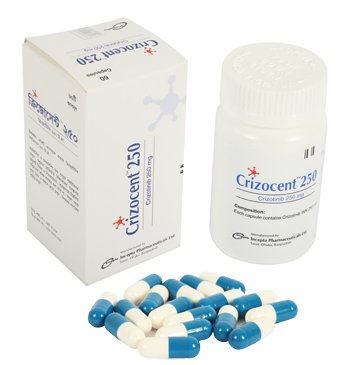
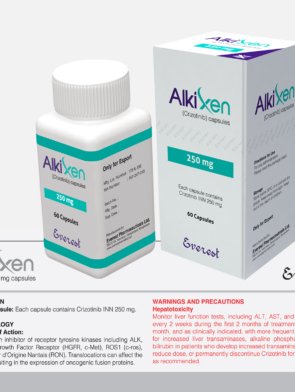
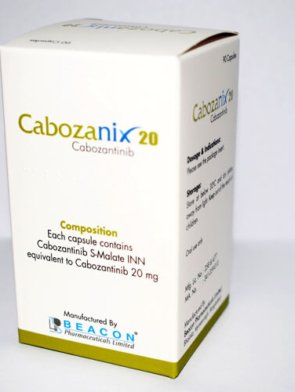
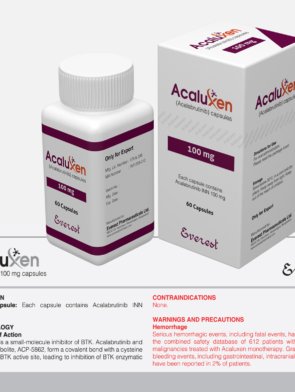
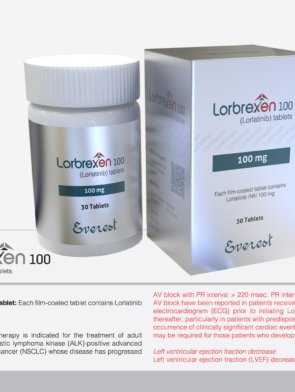
Reviews
There are no reviews yet.